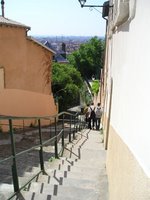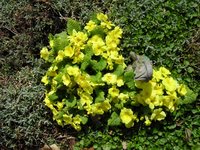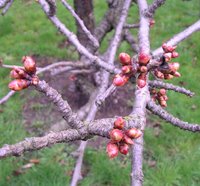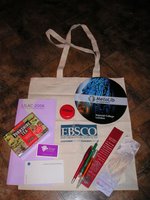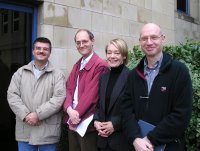
This is the 2nd report from the
LILAC conference earlier this week. Themes which emerged more than last year were “context” and “reflection”. I enjoyed all the keynote sessions which I attended (unfortunately I had to leave before the last two sessions because of a meeting in Sheffield). This is in contrast to last year, when the keynotes were more of a mixed bag, ranging from very good to highly irritating.
Professor Dorothy Williams, from Robert Gordon University kicked things off on Monday with a talk entitled
Libraries supporting learners - really? This phrase (“Libraries supporting learners”) comes from a report about school libraries in Scotland - there have been some very useful Scottish documents on the impact and performance of school libraries (see my next posting). Dorothy highlighted the fact that there is increasing emphasis on the real world relevance of information literacy, and that the definitions are increasingly focusing on use of information (rather than just searching). This provokes the question “how can we prepare learners for the world beyond the doors of formal education?”
Dorothy questioned whether the models and frameworks of information literacy were enough. In her research on teachers’ perceptions of information literacy, the teachers seemed to find it difficult to engage with these models, or related them to the classroom. An important issue is “how to engage with where the learners and coming from and where the teachers are coming from.”
Again drawing on her research she identified how important
interaction (with peers, teacher or librarian) was in the learning process. But it’s the
quality of interaction that can make a difference, and in their research they found “many examples where the quality of the interaction was not supporting the learner”. It can’t be assumed that just because there is “interaction” it is good: they found examples of interactions where learners were demotivated by interactions in the library environment.
The three strategies which Dorothy proposed were:
-
Mediation within the learning process, intervention at the critical point to develop the student’s learning. In ordinary life, people use other people (friends, family, colleagues) a lot to help them understand and solve information problems, as has been shown by research. This process of mediation was something that needed to be brought into the everyday work of the library, not just in training sessions;
-
Reflection “encouraging self-awareness of information experiences and strategies; metacognition”;
-
Integration within teaching and learning - this doesn’t just mean integration into a course of study, but into the learning context.
She then focused again on her research into school teachers’ information literacy, and how they talked about the importance of information literacy, but the problem of incorporating it into their students’ learning (partly and significantly because of the constraints of the national curriculum and the performance culture fostered by the Government).
Dorothy finished by saying that, rather than the role being “Libraries supporting learners” it should be “
Librarians developing learners”. As with our research with academics, Dorothy and her colleagues had found teachers more enthusiastic about “librarians” than about “libraries.” From a marketing perspective (my observation) this fits in with ideas of Relationship Marketing. The “development” role is obviously more proactive and responsible than “support". Dorothy also talked about all library staff being involved, and I was reminded of a paper which I often cite when I’m teaching/writing about marketing, namely “Marketing is an attitude of mind.” (Ref 1), which says marketing is "a way of working, a way of living". When you get involved in information literacy you do see things through a slightly different lens..... on the other hand I think an information literacy evangelist in full flow describing the One True Way to Information Literacy can be a wee bit scary (nb I am not thinking of Dorothy here!)....
After writing this I realise that I won't have time to report any of the other sessions in this detail (need for a Life, need to tackle huge backlog of other stuff), so I'll just aim for a couple of shorter postings with some observations and highlights.
Reference 1: Orava, H. (1997) ‘Marketing is an attitude of mind’. In
63rd IFLA General Conference: Conference Proceedings, August 31 – September5, Copenhagen. The Hague: IFLA.
www.ifla.org/IV/ifla63/63orah.htmPhoto by S. Webber: The hall at Leeds University where we had food, drink and the LILAC exhibition. You will see from the banner in the background that Leeds has apparently renamed itself "Leeds Fairtrade University" ;-).
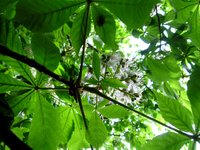 Together we are strong: peer support for learning and teaching development is an interesting one-day conference for library and information professionals, to be held at De Montfort University, Leicester, UK, 8 June 2006. The event is organised by two National Teaching Fellows, and supported by HEA SPS funding and the 'Infoteach' NTF project (http://www.infoteach.org/) To book, contact Chris Powis, Learning Support Co-ordinator, Rockingham Library, University of Northampton, tel. 01604 892229, email chris.powis@northampton.ac.uk
Together we are strong: peer support for learning and teaching development is an interesting one-day conference for library and information professionals, to be held at De Montfort University, Leicester, UK, 8 June 2006. The event is organised by two National Teaching Fellows, and supported by HEA SPS funding and the 'Infoteach' NTF project (http://www.infoteach.org/) To book, contact Chris Powis, Learning Support Co-ordinator, Rockingham Library, University of Northampton, tel. 01604 892229, email chris.powis@northampton.ac.uk





